Operational Excellence - One Way Optimism is Constructed at Procore
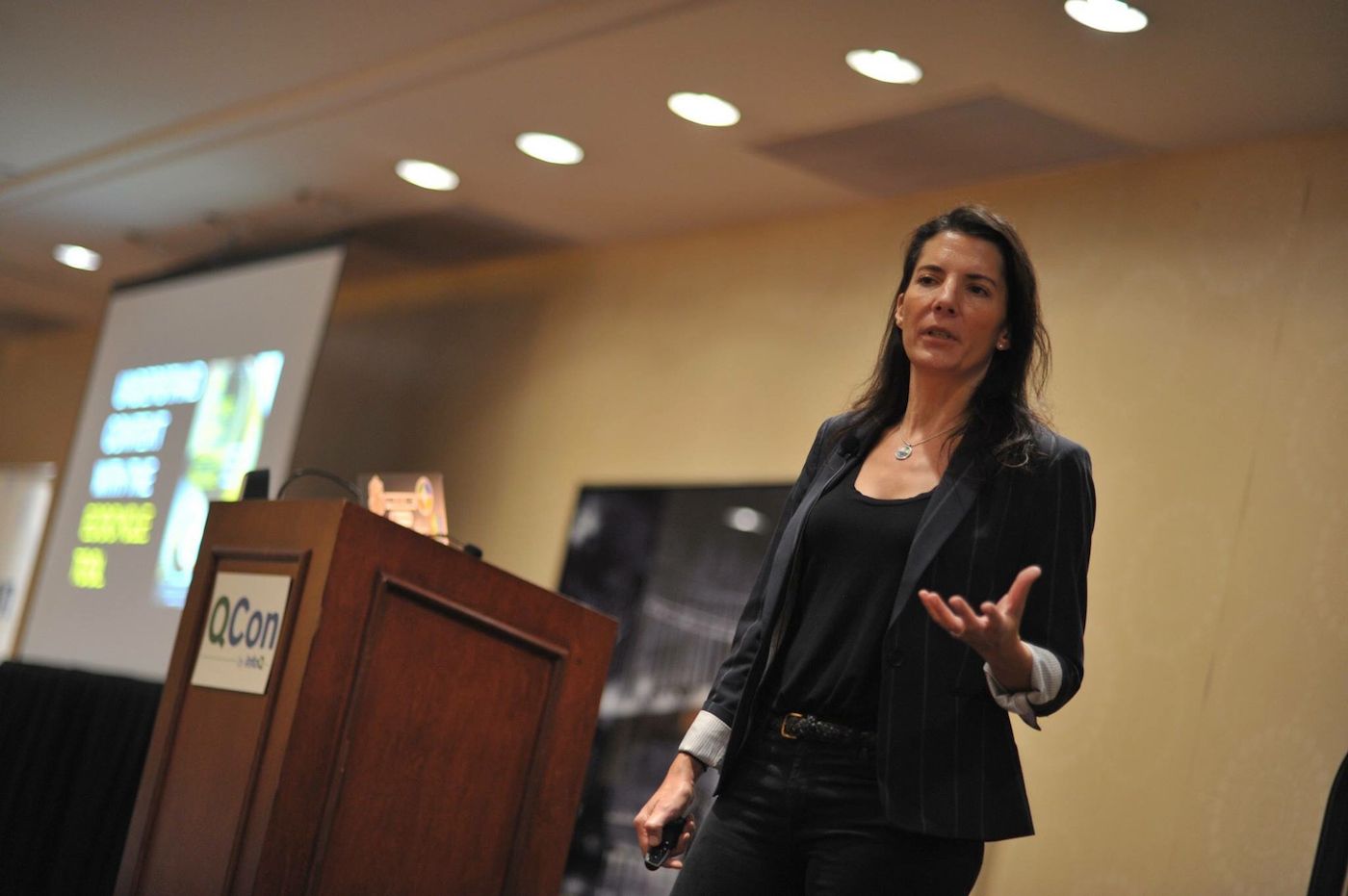
Heidi Helfand is Director of Engineering Excellence at Procore Technologies. She is also the author of the book Dynamic Reteaming, the Art and Wisdom of Changing Teams and is an international keynote speaker in the software industry.
Heidi recently lead the Operational Excellence event for Procore's R&D organization and offers up a deep dive here into the event, how it was produced and why.
Event Blueprint
In Procore R&D, we not only “build the software that builds the world,” but we also actively build our growing R&D organization. One example is our recent Operational Excellence Summit, which was designed to not only foster tighter collaboration and alignment between our product and platform tribes, but also to create conditions for new leaders to emerge and lead initiatives that they are passionate about.
When faced with the challenge of designing an event for 350 people, our first obstacle was finding a space to host the event. Our CTO, Sam Crigman, suggested the open warehouse space we have across the freeway from our campus in Carpinteria. We took a trip across the 101 and looked into our options.
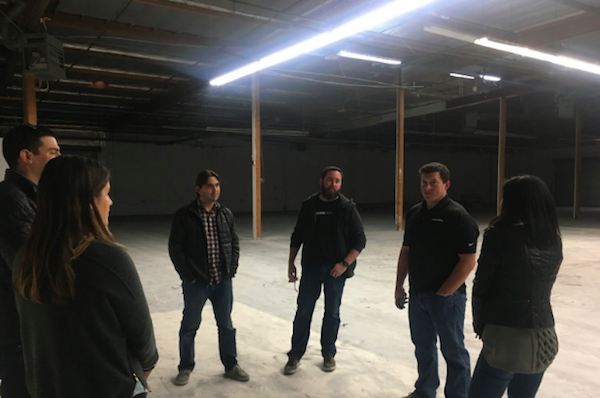
While exploring the space, a sense of excitement and possibility overcame our group. “This just might work,” we thought. One of Procore’s company values is optimism and we believed this was an opportunity to truly exemplify that.The focus of our event was on operational excellence, which we believe means “doing more with what we have.”
We formed a cross-functional team to tackle the challenge, including team members from Workplace Experience , Facilities, IT, Finance and R&D. Within weeks, the space was transformed and ready to host this department-wide event.
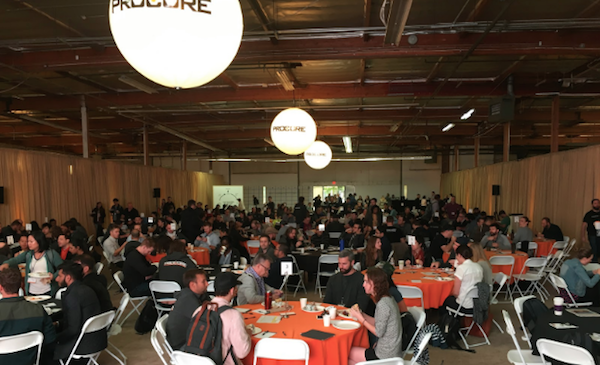
I firmly believe that we get to carve out our futures and sometimes that involves taking bold risks and imagining wild potential. I was personally so elated that our team was up for the challenge of transforming this space. In the same regard, I believe Procore is transforming the construction industry by developing tools that connect and empower the people who build the world. Through the Operational Excellence event, we built out a space to connect and empower the people who build the software for the people who build the world. We constructed a primitive whole - the start of a highly functional space that is able to continue to evolve as we move forward and as our needs for the space change. There are already other departments within Procore who are lining up to use this space to hold their own large events.
We had wild freedom to construct our space to best match up with the actual work we wanted to do. The layout, furniture and design of meeting spaces impacts the facilitation and therefore learning that is possible. When you’re restricted to furniture that is not movable within spaces, you restrict the learning opportunities. For instance, if you are only meeting in rooms that are dominated by huge boardroom tables, it’s extremely hard to do activities that require movement in the space. Having this facilitation freedom gave us a blank slate to construct our event, and to do activities like the linear constellation.
In a linear constellation, participants walk away from, and towards a line of tape on the floor. They do this to show their alignment with issues. For instance, we walked towards and away from the center of the room to show our response to questions like, “the vision in Procore R&D is clear to me.” This work helps build self-aware organizations, and taps into different areas of our brains used to express ideas differently. It’s in the differences that we express and realize that can tap into the potential of our collective intelligence. This helps us build better products for the construction industry.
Event Architecture
We really wanted to have an event to encourage not only operational excellence, but also to foster revolutionary improvement in the way that our tribes and squads collaborate together to build software our customers love. We wanted an event that would bring aliveness, passion and ownership. Here’s what we did.
The first day of our event was focused on getting better alignment on Procore’s vision from our CEO Tooey Courtemanche and also our CTO Sam Crigman and SVP of Product Brandon Terry. We’ve grown fast and firmly believe in squad and tribe autonomy. Re-aligning on what’s important to the business is a critical ingredient to the success of R&D and Procore as a whole.
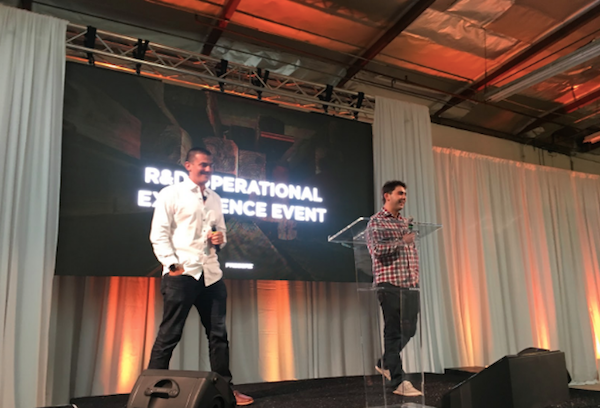
We work in cross-functional squads bundled into various tribes. Within the squads, we collaborate closely with roles including Engineering, Product Development, User Experience and Quality Assurance. We brought in experienced facilitators - Cynthia Loy Darst and David Darst who, with their team of facilitators, led our tribes through a process called Lands Work, which is from Organizational Relationship Systems Coaching (ORSC).
Lands Work is an activity where people from different cross functional roles share their needs and challenges with each other. On the floor there are signs denoting each cross functional role. The people move around the space by walking around and exploring “what it’s like” in each of the roles or “lands.” They listen intently to their team members express their “lands.” Next, they “stand in the shoes” of the other roles and report back the challenges faced by their team members in other roles. This is empathy in action. Through this process, trust is encouraged and strengthened within our teams. People have the natural inclination to want to help each other after experiencing activities like this.
As evident in research from Google’s Project Aristotle a couple of years ago, some of the best performing teams in the industry are the ones where the team members feel a sense of psychological safety. The teams that thrive contain an environment where people feel free to express who they are. The people feel safe to share their opinions without the worry of having their ideas criticized. It’s important for us at Procore to cultivate a supportive, safe, creative workplace where people can be the best that they can be. We believe that this is a competitive advantage and that it translates to software that delights our customers. This is one of the main reasons we did this Lands work with the Darsts.
Days two and three of our event encouraged revolutionary change across our R&D department, and kicked off a continuous improvement initiative that will live on for 90 days past this event - the time when we will come back together as an R&D org to kickstart another cycle of change and improvement.
For this part of the event, we invited Dan Mezick to facilitate an Open Space event, followed by a day of action planning. Dan is the author of books including Open Space Agility and the Culture Game. He is an international leader in helping organizations transform in ways that really match with Procore’s values of openness, ownership and optimism. Here is what the opening circle of our open space looked like.
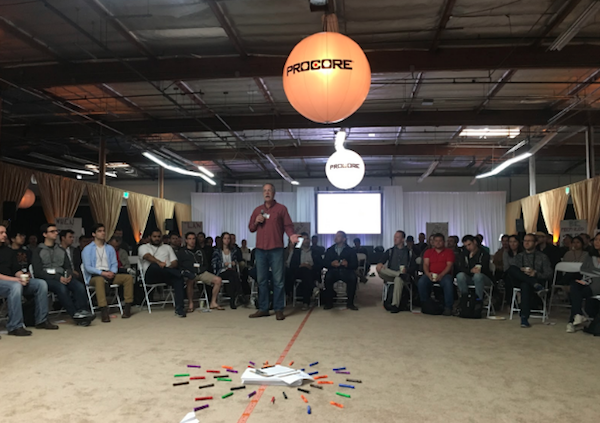
An Open Space event is also known to some as an “unconference”. The people who attend the event are the ones that are empowered to construct the event schedule. Through deliberate communication and structure, it was electrifying to see the schedule that our R&D team felt would best benefit our group to solve our challenge of how to improve collaboration across our R&D organization.
We’ve grown fast, and leveraging a structure like open space gave people a clear and actionable way to get their voices heard. When anyone can offer up a session and convene those interested, you also have a highly efficient way to encourage interest groups or guilds to form immediately around the issues the people feel are important. This type of “big bang” revolutionary reflection and action is a missing part of traditional Agile approaches which focus only on the team level for such activities. Procore is on the way to becoming a thought leader in organizational awesomeness.
Procore promises all employees autonomy, mastery and purpose - three concepts essential to fostering innovation as written about in Dan Pink’s book “Drive”. The handshake, or promise back from employees to Procore is accountability and best work, intellectual curiosity and passion and engagement. So how do you actually encourage that? You create the conditions for it to emerge, using a liberating structure like open space - plain and simple.
We worked hard during the open space to surface the issues, the passion and the people who want to drive key innovations across our org. Part of open space is in constructing a “proceedings” document the night after the open space which captures the key outcomes as written by the participants of each of the sessions. Our 125-page book was created, printed, and disseminated to our group the next morning.
When we arrived at day 3, we took some time to read through the proceedings. Next, I had the honor of facilitating a highly interactive liberating structures activity called 25/10 crowdsourcing. In the activity, people write one key idea that they think will move our org forward in the next 90 days. Through 5 rounds of exchanging cards and scoring them, we crowdsourced the top 16 items that the 350-people felt were important to our organization. We then had interactive discussions to deepen the issues and were able to distill down the 16 items into 7 key initiatives to move forward. Next, our leaders went through these 7 items during our lunch break, and crafted a presentation to frame each of these issues from a leadership perspective so that the resulting action teams would not only have autonomy to pursue the issues, but also alignment, and boundary conditions for the issues so that they would be realistic and successful.
Ownership is another one of our values at Procore. The final phase of the day was for people to be invited to step up as leaders of these initiatives. People volunteered to do that, and the people who were motivated to team up and move the initiatives forward with them in the next 90 days spent the rest of the event, crafting, imagining, and constructing the changes that they want to see in our R&D organization.
When you’re a new employee, not only is “getting up to speed” important, but probably even more is getting a sense of “belonging” within your organization. Knowing how to share your voice, and finding others with common ground is thoroughly supported and encouraged through a structure like open space. In addition, having deliberate, structured events to foster relationship building amongst people that have been at the company for years, with new people that have joined recently is imperative. When your company is growing like Procore is, you’re going through a sense of culture change, and integration. Everyone, both new and old at the company are charged with the mission to “build the software that builds the world”. When you know and care about the people you work with, everything else is easier. Relationship building through liberating structures like open space are building blocks for dynamic reteaming and other highly agile approaches to product development that we experience within Procore R&D.
